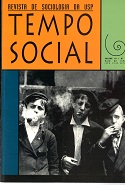Rethinking the theory of professionals’ proletarianization
DOI:
https://doi.org/10.1590/ts.v10i1.86765Keywords:
Professionals, Proletarianization, Deprofessionalization, Technical autonomyAbstract
The author analyzes the theory of the professionals’ proletarianization with the objective of verifying to what extent it captures the real processes of change that have been affecting the professions. The central questions that the author addresses are whether professionals employed by public and private bureaucracies preserve their technical qualifications, and whether they preserve control over their highly specialized knowledge and over their work process. Using an extensive bibliography on professional work in several industries (metal, mechanic, electronic), the author concludes that the evidences of growing employment of some of the liberal professions does not constitute support for the thesis of the professionals’ proletarianization when this term is appropriately understood. The research has shown that even when the professional employee loses the control over his work conditions, he keeps the control over his own work, that is, he conserves his technical autonomy.Downloads
References
BELL, Daniel. (1977) O Advento da sociedade pós-industrial. São Paulo, Cultrix.
BECKMAN, Savante. (1990) Professionalization: borderline autority and autonomy in work. In: BURRAGE, Michael & TORSTENDAHL, Rolf (eds.). London, Sage Publications.
BRAVERMAN, Harry. (1977) Trabalho e capital monopolista – a degradação do trabalho no século XX. Rio de Janeiro, Zahar.
CAVESTRO, William. (1984) Automatization, organization du travail et qualification dans les PME: le cas des machines-outils à commande numérique. Sociologie du Travail, 4: 434-446. Dicionário das Profissões. (1981) 3ª ed. São Paulo, CIEE (Centro de Integração Empresa Escola).
DENT, Mike. (1993) Professionalism, educated labour and the state: hospital medicine and the new manegerialism. The Sociological Review, 41(2): 244-273, May.
DERBER, Charles. (1983a) Managing professionals: ideological proletarization and post-industrial labour. Theory and Society, 12(3): 309-341.
DERBER, Charles. (1983b) Sponsorship and the control of physicians. Theory and Society, 12(5): 561-601.
DINIZ, Marli. (1995) Os Donos do saber: profissões e monopólios profissionais. Rio de Janeiro, 286 p. Tese (Doutorado). IUPERJ.
DONNANGELO, Maria Cecília F. (1975) Medicina e sociedade: o médico e seu mercado de trabalho. São Paulo, Pioneira.
DURAND, José Carlos Garcia. (s.d.) A profissão de arquiteto: estudo sociológico. Rio de Janeiro, CREA.
FALABELLA, Gonzalo. (1988) Uma discussão teórico-comparativa: análise de experiências internacionais. In: NADER, Ricardo Toledo et alii. Automação e movimento sindical no Brasil. São Paulo, Hucitec, p. 13-24.
FREIDSON, Eliot. (1970) Profession of medicine: a study of applied knowledge. New York, Dodd, Mead and Co.
FREIDSON, Eliot. (1986) Professional power: a study of the institutionalization of formal knowledge. Chicago, The University of Chicago Press.
FREIDSON, Eliot. (1993) Professionalism and the occupational principle. In: (ed.). The professions and their prospects. London, Sage, 19-38.
FREYSSENET, Michel. (1984) La requalification des operateurs et la forme sociale actuelle d’automatization. Sociologie du Travail, 4: 422-433.
GAGLIANI, Giorgio. (1981) How many working classes? American Journal of Sociology, 87(2): 259-285, Sept.
GILL, Colin. (1984) Nouvelle techonologie, déqualification et stratégies de l’entreprise. Le débat en Grande-Bretagne. Sociologie du Travail, 4: 558-563.
HALLIDAY, Terence C. (1985) Knowlwdge mandates: colletive influence by scientific, normative and syncretic professions. The British Journal of Sociology, 36(3): 421-447, Sept.
JONES, Bryn & WOOD, Stephen. (1984) Qualifications tacites, division du travail et nouvelles technologies. Sociologie du Travail, 4: 407-421.
KERN, Horst & SCHUMANN, Michael. (1984) Vers une reprofissionalization du travail industriel. Sociologie du Travail, 4: 389-406.
LARSON, Magali S. (1977) The rise of professionalism: a sociological analysis. Berkeley, University of California Press.
LARSON, Magali S. (1980) Professionalization and educated labour. Theory and Society, 9(1): 131-175, Jan.
LEE, D. J. (1981) Skill, craft and class: a theoretical critique and a critical case. Sociology, 15(1): 56-78, Feb.
LUZ, Talita Ribeiro da. (1989) Microeletrônica e ocupação: o impacto na profissão de contador. Revista de Administração de Empresas, 29(2):5-18, abril-junho. Estoques de Profissionais do Nível Superior. (s.d.) Estudos Estatísticos (edição preliminar). Brasília, MEC – Ministério da Educação e Cultura.
PRANDI, Reginaldo. (1982) Os favoritos degradados: ensino superior e profissões de nível universitário no Brasil hoje. São Paulo, Loyola.
RITZER, George & WALCZAK, David. (1988) Rationalization and the desprofessionalization of physicians. Social Forces, 67(1): 1-22, Sept.
SCHMITZ, Hubert. (1985) A microeletrônica: suas implicações sobre o emprego e o salário. Pesquisa e Planejamento Econômico, 15(3): 639-680, dez.
SIMÕES, Solange de Deus. (1989) The position of engineers in the brasilian class structure and their industrial and political orientation. Ph.D. dissertation. London School of Economics and Political Science.
SOUZA, Nair Heloisa Bicalho de. (1988) Os efeitos da nova tecnologia nas fábricas. In: NADER, Ricardo Toledo et alii. Automação e Movimento Sindical no Brasil. São Paulo, Hucitec, 87-131.
STARK, David. (1980) Class struggle and the transformation of the labour process. Theory and Society, 9(1): 89-130, Jan.
WHALLEY, Peter. (1984) Deskilling engineers? the labour process, labour markets and labour segmentation. Social Problems, 32(2): 117-132, Dec.
WHALLEY, Peter. (1986) Markets, managers, and technical autonomy. Theory and Society, 15(1-2): 233-347.
WHALLEY, Peter. & CRAWFORD, Stephen. (1984) Locating technical workers in the class structure. Politics and Society, 13: 239-252.
WILKINSON, Barry. (1984) Technologie, qualifications et formation: une étude de cas sur les machines à commande numérique. Sociologie du Travail, 4: 447-456.
ZUSSMAN, Robert. (1984) The middle-levels: engineers and the working middle class. Politics and Society, 13(3): 217-237.
Downloads
Published
Issue
Section
License
Copyright (c) 1998 Tempo Social

This work is licensed under a Creative Commons Attribution-NonCommercial 4.0 International License.


